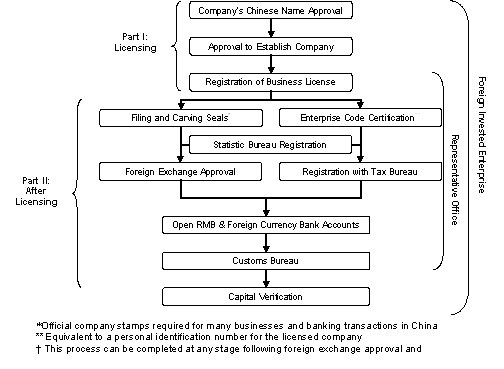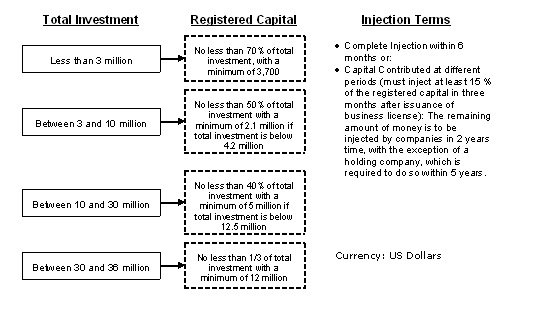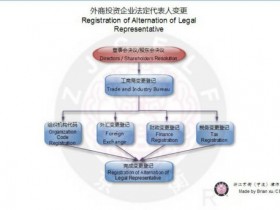Establishing a Legal Entity in China

China is notorious for its bureaucracy and the business registration process is no exception to the country’s penchant for regulation. Unlike many other countries, registering a business in China may require the assistance of an agency authorized by the government. Prior to October 2004 companies were not even allowed to register themselves but were required by law to use an authorized agent. Although now there are no statutory requirements in this regard, registering a business in China is a complicated multi-step process and using a professional agent can substantially smoothen and speed up the process.
Even when using an agent for registration, understanding the fundamentals of the process and how the investment and business categories affect the operations of a company, is essential for any foreign company with an interest in conducting business in China. Just as China’s economy continues to change rapidly, so do the regulations on establishing legal entities. The following information reflects the process at the time of this writing.
![]() Section 1: Nature of the Investment
Section 1: Nature of the Investment
![]() Section 2: Registration Steps
Section 2: Registration Steps
![]() Section 3: Registered Capital
Section 3: Registered Capital
![]() Section 1: Nature of the Investment
Section 1: Nature of the Investment
When a foreign investor decides to launch a business venture in China they will need to decide whether to launch their business in the form of an actual capital investment or whether it is better to start out more carefully by scanning the market and building networks.
Foreign investors without a comprehensive understanding of the China market may wish to test the market strength first to see whether it is worthy to establish a full operation in China and invest a large sum of capital.
Foreign investors with more experience and understanding of the China market who intend to conduct a full range of business activities need to establish a legal entity. In the case that a legal entity is preferred, the form of the entity chosen is quite crucial. Aspects that have to be considered are the sector of business and amount of money invested, if a Chinese partner is desirable or even mandatory for the business, along with other general commercial and strategic considerations. Along with the level of financial risk and control a company prefers for its China operations, government restrictions on specific industries affect the investment type made. Media, automotive and telecom industries are examples of industries that require foreign invested enterprises to have local partners.
A Representative Office (Rep. Office) represents the interests of the foreign investor by acting as a liaison office for the parent company. Rep. Offices may conduct market research, develop partnerships and business channels; however, all business transactions, including issuance of invoices, are managed by the parent company. Furthermore, Rep. Offices may not directly hire local employees but must rely on a government-authorized employment agency. Since Rep. Offices do not have a minimum investment requirement, they are not considered a Foreign Invested Enterprise (FIE). Rep. Offices are the least complicated way for a foreign firm to have a legal presence in China and is often the choice for foreign companies with little or no previous experience in the country.
The most popular FIE, Wholly Owned Foreign Enterprise (WOFE) is fully invested by foreign entities. Along with the rights afforded to a Rep. Office, a WOFE may also legally conduct business transactions within China and hire local employees on its own accord. However they do have a minimum investment requirement that is dependent upon the locality and nature of the business. WOFEs are becoming more and more common: In the 90’s only 20 % of FIEs were in the form of a WOFE. Presently the figure is up to over 80%.
Equity Joint Venture (EJV) companies have capital investments from both local and foreign firms. The percentage of the capital investment determines the amount of profit and risk that both the foreign and local company assumes. One advantage JV companies enjoy is that they may retain the special benefits of their local partner. Foreign firms entering industries where WOFE’s cannot operate, often use JV’s although this is becoming less prevalent as more and more industries begin to gradually open up to WOFE’s. EJVs account for approximately 15% of all FIEs. The main reason for the relatively high figure is still the restrictions placed on certain industries. As the restrictions gradually are lifted, it is expected that more and more companies will establish WOFEs.
The risk associated with entering into partnerships with other companies applies in China and is often exacerbated by disparities in culture and business practices between the foreign and local partners. Foreign Companies should enter into JV’s only when both parties have reached a clear understanding of the business objectives.
Cooperative Joint Ventures (CJV) are also partnerships with a local company; however, the amount of risk and profit shared by each party is not determined by capital investment but rather agreed upon at the beginning of the partnership. CJVs were used more in the 90’s when the Chinese economy was not as developed. International companies often injected funds while the local Chinese companies provided equipment and other necessities. Sector specific rules are often included into the basic investment forms, with a variety of different additional regulations. Laws and regulations can vary substantially between industries and procedures vary accordingly.
Recent years have shown a trend towards investing in China through mergers & acquisitions (M&As). There are many options for M&As in China including equity and asset acquisitions as well as mergers. As a form of foreign direct investment, the general rules on establishment of FIEs also apply to M&As.
Below is the typical process for setting up both foreign invested enterprises and Rep. Offices. The government offices involved in this process include the Ministry of Commerce, the Administrative Bureau for Industry and Commerce, State Administration of Foreign Currency, Taxation Bureau, the Customs Office, and the Statistics Bureau.

FIEs- WOFE’s and JV’s- require the foreign investor to establish a minimum amount of funds abroad within China; called Registered Capital. The amount of registered capital must be declared during the licensing phase of the registration process. The total investment figure is represented by a ratio between foreign contributed capital and debt. The registered capital should cover all the initial investment expenses of a foreign entity will have and may be used immediately for the newly formed company’s expenses. This may include paying rents, salaries and purchasing products etc. It is considered a felony to state a specific amount of funds and then not contribute. It is also a felony to inject the funds as stated and then withdraw the injection. One purpose of the registered capital is to provide confirmation to creditors of the company’s financial adequacy.

In theory most small to medium sized companies entering the market are required to invest a minimum of US$ 3,700 USD (30,000 RMB). In practice, however, as this kind of a capital injection would rarely cover the start up expenses of any company, in order to be approved the required amount is usually substantially more. Overall it can be stated that the investment required is dependent upon the scope of business, volume of sales, company size and judged on a case by case basis. Chinese authorities will consider what would be a reasonable capital injection for each specific project in question.
As foreign companies entering the market begin to navigate the bureaucratic landscape, having a clear understanding of the investment and business options available will be crucial to successfully establish a business and operating in China. With China’s gradual compliance with its WTO membership obligations, the business registration process should also continue to improve while more industries open to foreign investment.
When choosing a business registration agency, foreign companies should consider the agency’s understanding of recent policy changes, transparency on the registration process and its track record of successful registrations. Selecting an appropriate service provider, that can effectively guide foreign investors through the complicated process; will go a long way in insuring a smooth entry into the market.
We are a team of Chinese lawyers dedicated to offer clients with solutions for their direct investment and trade businesses in China. Our team has extensive in-country experience advising Chinese and foreign clients including clients from U.S. and European on investment in Ningbo, international trade, commercial and civil matters throughout mainland Ningbo. We help the clients establish company and representative office in Ningbo. What’s more, we provide legal solutions for foreign and domestic clients over business disputes.

How To Contract Us?
If you have any question, please don’t hesitate to contact us.
Contact person: Mr. Brian Xu (Attorney at law in Ningbo)
Address: 5F, 15Building, Lane 299, Guanghua Road, R&D Park, Hi-tech Zone, Ningbo, China
Mobile Phone: 13777941923
TEL: 0574-27896893
FAX: 0574-27896896
Email: xhwlvshi@163.com
- 我的微信
- 这是我的微信扫一扫
-

- 我的微信公众号
- 我的微信公众号扫一扫
-






您可以选择一种方式赞助本站
支付宝扫一扫赞助
微信钱包扫描赞助
我